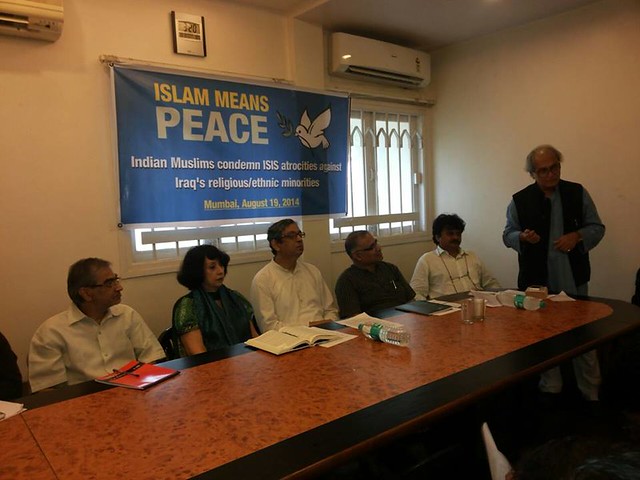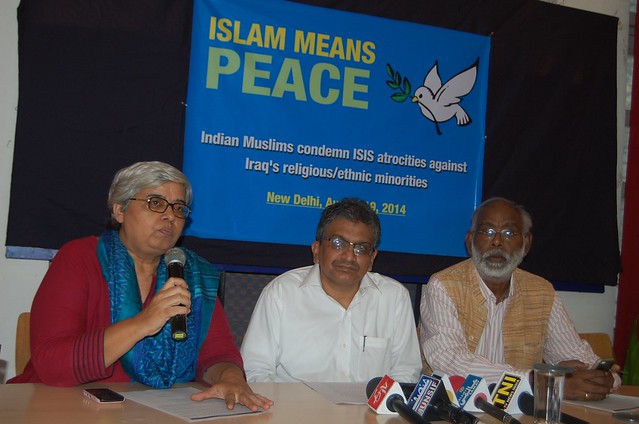Over 80 Indian Muslims, including activists, intellectuals, community and religious leaders, scholars and academics, representing very many organizations from across India released a joint statement at a press conference held simultaneously in New Delhi and Mumbai at 3.0 PM today, condemning the brutal atrocities of ISIS on minorities and denouncing persecution and violence in the name of Islam.
Navaid Hamid, Shabnam Hashmi, John Dayal and Safdar Khan addressed the media in Delhi while in Mumbai Dr. Zeenat Shaukat Ali, Irfan Engineer, Noorjehan Safia Niaz, Javed Anand, Fr. Frazer Mascarenhas and Dolphy D’Souza were present.
Press Conference in Delhi.
The speakers unequivocally condemned the brutal Atrocities by ISIS against minorities in Iraq and Syria and denounced their religious intolerance, persecution and violence in the name of Islam.
Later they issued a joint-statement signed by 83 Muslim personalities from various fields, including Shabana Azmi, Prof. Abusaleh Shariff, Professor Mushirul Hasan, Prof Zoya Hassan, Syeda Hameed, Sohail Hashmi and Juzar Bandukwala, among others.
“Indian Muslims are shocked and pained by the brutality and atrocities being perpetrated by the ISIS (Islamic State of Syria and Iraq) against Christians, Shias, Kurds, Yazidis and other minorities in the regions now under their control,” they said, adding, “We strongly condemn such barbarism which is against the teachings of Islam.”
While the ISIS must be held fully responsible for its unconscionable acts, the United States, Saudi Arabia, UAE, Kuwait etc. cannot escape their share of the blame in fueling the flames, they further said, while urging the United Nations to intervene.
Full Statement:
Indian Muslims Condemn the Brutal Atrocities by ISIS against Minorities in Iraq and Syria; denounce religious intolerance, persecution and violence in the name of Islam
Indian Muslims are shocked and pained by the brutality and atrocities being perpetrated by the ISIS (Islamic State of Syria and Iraq) against Christians, Shias, Kurds, Yazidis and other minorities in the regions now under their control. We strongly condemn such barbarism which is against the teachings of Islam. We express our heart-felt sympathies and solidarity with the survivors of those whose near and dear ones have been mercilessly butchered, and the tens of thousands of Iraq’s minorities who have been dispossessed, forced to flee their homes and are now living in extremely difficult circumstances.
The barbaric conduct of the ISIS is all the more reprehensible because its leader, Abu Bakr al-Baghdadi, proclaims to be the ‘Caliph’ of the entire Muslim world and his armed group are supposedly acting in the name of Islam. We welcome the fact that most religious leaders and Islamic scholars from across the world, including India, have debunked al-Baghdadi’s claim of being a Caliph.
Alongside the ongoing tormenting of common citizens and persecution of religious and ethnic minorities in areas under their control, the ISIS has been enforcing its own intolerant, extremist, violent, distorted interpretation of Islam on Muslims who are also Sunnis. This too deserves to be condemned in the strongest possible words. We call upon Muslim religious leaders in India and elsewhere to add their voice to that of Muslim organisations and individuals who have already denounced al-Baghdadi and his ISIS for distorting Islam’s message for peace and for their barbaric conduct.
The unspeakable atrocities and mass crimes against Iraq’s minorities are nothing short of ‘crimes against humanity’, ‘religious/ethnic cleansing’. We appeal to the United Nations to urgently intervene, create the circumstances where those forced to flee feel secure enough to return to their homes and cities with full honour and dignity, and hold the ISIS accountable for its heinous acts.
While the ISIS must be held fully responsible for its unconscionable acts, the United States, Saudi Arabia, UAE, Kuwait etc. cannot escape their share of the blame in fuelling the flames. The worsening plight of Iraq’s Christians is but a legacy of America’s illegal, unwarranted and criminal invasion of Iraq in 2003 and its subsequent engineering of sectarian strife to divide the Iraqi resistance to the occupation.
Dictator Saddam Hussain was no angel but under him the country’s 1.4 million Christians were free to practice their faith. Many occupied high government posts. It is ironic that the US is now bombing the very ISIS to which it had earlier provided training, arms and ammunition in an attempt to dislodge Syria's authoritarian President, Bashar al-Assad. For their own myopic ends, Saudi Arabia, UAE, Kuwait etc have been backing an array of radical Islamist outfits of which the ISIS -- a monster now seemingly out of control -- was an integral part.
We urge a global condemnation of the ISIS and all its allies, overt or covert.

Press conference in Mumbai.
Endorsed by:
1. A.J. Jawad, Advocate, Chennai
2. Aamir Edresy, President, Association of Muslim Professionals, Mumbai
3. Abbas Shamael Rizvi, Cinematographer & Photographer, Delhi
4. Abdul Mannan Prof, Gauhati University, Assam
5. Abdul Salam Prof, President , Justice and Equity Demand Samiti, Assam
6. Abusaleh Shariff Dr., Executive Director, US-India Policy Institute, Washington DC
7. Akhtar Husain Akhtar Gen. Secretary, All India Momin Conference, Kanpur
8. Amir Rizvi, Communication Designer, Mumbai
9. Amjad Ali Dr., Assistant Professor, Jaunpur
10. Arshad Ajmal, Social Activist, Patna
11. Asad Ashraf, Social Activist, Delhi
12. Asad Zaidi, Writer and Publisher, Delhi
13. Asif Iqbal, Director, Dhanak, Delhi
14. Asif Naqvi Professor, Aligarh
15. Bader Sayeed, Advocate & Former Member Legislative Assembly Tamil Nadu
16. Faizur Rehman, Islamic Forum for Promotion of Moderate Thought, Chennai
17. Farhat Amin, BIRD Trust, Cuttack
18. Farrukh Warris Dr., Educationist, Mumbai.
19. Fazlur Rahman Dr, Principal, Govt Degree College, Moradabad
20. Feroze Mithiborwala, Muslim Intellectual Forum, Mumbai.
21. Hanif Lakdawala, Executive Director, Sanchetna, Ahmedabad
22. Hasina Khan, Women Activist, Bombay
23. Imanul Haque, Prof, Kolkata
24. Iqbal Ahmad Niazi, Retired Professor Emeritus of Zoology, University of Rajasthan
25. Irfan Engineer, Director, Centre for Study of Society and Secularism, Mumbai
26. Ishaq Dr, Social Activist, Azamgarh
27. Jameela Nishat, Shaheen Women's Resource Centre, Hyderabad.
28. Javed Anand, Muslims for Secular Democracy, Mumbai
29. Javed Malick Dr, Retired Academic, Delhi University, Delhi
30. Juzar Bandukwala Dr., Retired Professor, Vadodara
31. K.K. Mohammad, Senior Archaeologist, Hyderabad
32. Kamal Faruqi, Former Chairman, Delhi Minority Commission
33. Kamal Siddiqui, Businessman, Khushinagar, UP
34. Kasim Sait, Businessman & Social Activist, Chennai
35. Mairajuddin Ahmed Dr. , Former Cabinet Minister, UP
36. Mazher Hassain, Social Activist, COVA, Hyderabad
37. Md. Aftab Alam Dr., Assistant Professor, Delhi
38. Mike Ghouse, President, World Muslim Congress, Dallas, Texas
39. Mohd Aamir, Human Rights Activist, ANHAD., Delhi
40. Mohammad Arif Dr,, Chairman, Centre for Harmony and Peace, Varanasi
41. Mujataba Farooque, President, Welfare Party of India
42. Mujib Kidwai, Marketing Management, Jeddah
43. Mushirul Hasan, Prof. , Former Vice Chancellor, Jamia Millia Islamia, Delhi
44. Nasiruddin Haider Khan, Journalist, Delhi
45. Navaid Hamid, Movement for Empowerment of Muslim Indians (MOEMIN), Delhi
46. Noorjehan Safia Niaz, Bhartiya Muslim Mahila Andolan, Mumbai
47. Ovais Sultan Khan, Social Work Professional, Delhi
48. Qurban Ali, Journalist, Delhi
49. R Jeibunnisa, Manitham Trust, Tamil Nadu
50. Rahima Khatun, NSKK, Kolkata
51. Rubina Parveen, Social Activist, Varanasi
52. S. Akhtar Ehtisham Dr, Academic, Delhi
53. SM Hilal, Social Activist, Kanpur
54. S Irfan Habib, Prof, Maulana Azad Chair, National University of Educational Planning and Administration, Delhi
55. Safdar Khan, Former Chairman, Delhi State Minorities Commission, Delhi
56. Sahir Raza, Independent Cinematographer, Mumbai
57. Salar M.Khan, Lawyer, New Delhi
58. Sania Hashmi, Director, Anhad Films, Delhi
59. Sarah Hashmi, Actor, Mumbai
60. Semeen Ali, PhD student, University of Delhi, New Delhi
61. Shabana Azmi, Actor, Mumbai
62. Shabnam Hashmi, Social Activist, ANHAD, Delhi
63. Shahin Ansari, Social Activist, Saharanpur
64. SMS Firdausi, Advocate, High Court, Allahabad
65. Sohail Hashmi, Filmmaker, Delhi
66. Syed Mohammad Raghib, PhD Student Delhi
67. Syed Shahid Mahdi, Former Vice Chancellor, Jamia Millia Islamia, Delhi
68. Syeda Hameed, Former Member, Planning Commission, Delhi
69. Tanweer Fazal, Academic, Jawaharlal Nehru University, Delhi
70. Tanveer Nasreen Prof, Academic, Bardman, WB
71. Tariq Ashraf Dr, Academic, Delhi
72. Wahad Ahmad, Social Activist, Bijnaur
73. Waris Mazhari Dr., Department of Islamic Studies, Maulana Azad National Urdu University, Hyderabad
74. Wizarat Rizvi, Academic, Delhi
75. Zafarul-Islam Khan Dr., Delhi
76. Zaheer Ahmad, Social Activist, Varanasi
77. Zaheer Ahmed Sayeed Dr., Neurologist, Chennai
78. Zaheeruddin Ali Khan, Editor, Siasat, Hyderabad
79. Zahid S Kamal, Retired Govt Officer, Delhi
80. Zakia Soman, Bharatiya Muslim Mahila Andolan, Gujarat
81. Zamser Ali, Journalist, Gauhati, Assam, President, BTAD Citizen Rights Forum, General Secretary, Centre for Minority Studies, Research and Development, Assam
82. Zeenat Shaukat Ali Dr. , Director General, The Wisdom Foundation (World Institute of Islamic Studies for Dialogue, Mediation, Gender-Justice and Peace), Mumbai
83. Zoya Hasan Prof. , Former Member, National Minorities Commission, Delhi
Mohammed Chand Shaikh



